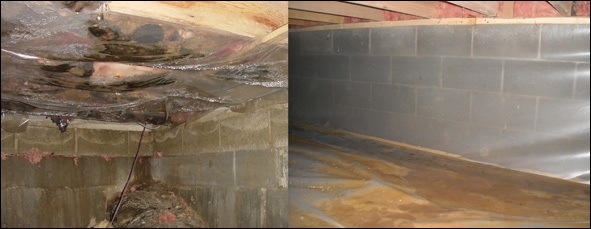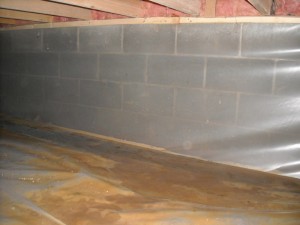
Crawlspace Vapor Barrier Myths
There are several ways of installing a vapor barrier in a crawlspace, but only one that works. We have provided a guide for you to determine if your vapor barrier is installed correctly.
1. Vapor Barrier under the Pea Gravel – This has become a very common yet incorrect method of installing a vapor barrier by builders. The thinking (if there was any) behind this was that the plastic would stop the water from coming through the ground. During construction, the vapor barrier is laid on the ground and 4″-6″ of pea gravel is dumped on top of the plastic.
During the rainy season, water comes in from the walls and the ground floor and pools on top of the vapor barrier. The end result is a swimming pool liner that holds water in the gravel for prolonged periods of time. All the water and moisture in the gravel back fill has to evaporate into the structure.
The solution would be to cut back the liner from the wall, install our DrainRite perimeter drainage system, and install a new vapor barrier or encapsulation system on top of the gravel.
2. Vapor Barrier attached to ceiling of crawlspace– A very common do it yourself method that can be very detrimental to the home. This method is responsible for more wood rot and mold growth than any other method. If this is done in your crawlspace, call a professional immediately. Many crawlspaces are vented and the cooler surfaces such as duct work, pipes, and the floor will condensate in the summer. The plastic will trap the condensation up against the floor structure causing mold growth and dry rot.
The solution is simple. Remove the plastic from the ceiling of the crawlspace, and install a new vapor barrier or encapsulation system on the ground floor.
3. Vapor Barrier ran up foundation wall and stapled to sill plate. – A common but incorrect approach by contractors that attempt to install an encapsulation system. An encapsulation system is a heavy-duty, cord-reinforced liner that is fastened and sealed to the foundation wall. Every potential gap or seam in the liner is sealed to prevent any moisture from evaporating. The vents are insulated and closed to prevent hot humid air from entering in the summer.
 In attempt to underbid competition, some contractors are installing a 6 or 10 mil plastic that is ran up the foundation walls and stapled to the sill plate. None of the overlapped seams are taped. It is basically a glorified vapor barrier on top of the ground floor being ran up the walls and stapled to the wood. They seal the vents without properly sealing the moisture from the ground floor or foundation walls.
In attempt to underbid competition, some contractors are installing a 6 or 10 mil plastic that is ran up the foundation walls and stapled to the sill plate. None of the overlapped seams are taped. It is basically a glorified vapor barrier on top of the ground floor being ran up the walls and stapled to the wood. They seal the vents without properly sealing the moisture from the ground floor or foundation walls.
The problem with fastening plastic to the sill plate is that moisture will “wick” up the foundation wall, and moisture will absorb into the sill plate and floor joists. All of this moisture will eventually deteriorate the sill plates and floor joists. Also, all the moisture under the vapor barrier will evaporate up through all of the seams that are not sealed.
The solution is being diligent in deciding who you choose to install your Encapsulation System.
4. Vapor barrier on ground floor of crawlspace – The most common and correct method for installing a vapor barrier in a crawlspace. A 6 mil polyethylene vapor barrier is placed over any ground floor. The ground floor could be river rock, pea gravel, dirt floor, sand, etc. The seams are typically overlapped 6” – 12” and almost never taped.
While this will reduce some moisture evaporation, it does not seal out all of the moisture from the internal perimeter walls where water penetration occurs. Also moisture can seep up from the seams, and the plastic is not durable enough to crawl on. Over time, the plastic will incur punctures and holes.
The solution to sealing all moisture evaporation from the ground floor of a crawlspace is to install our AmeriBrite Encapsulation System.
